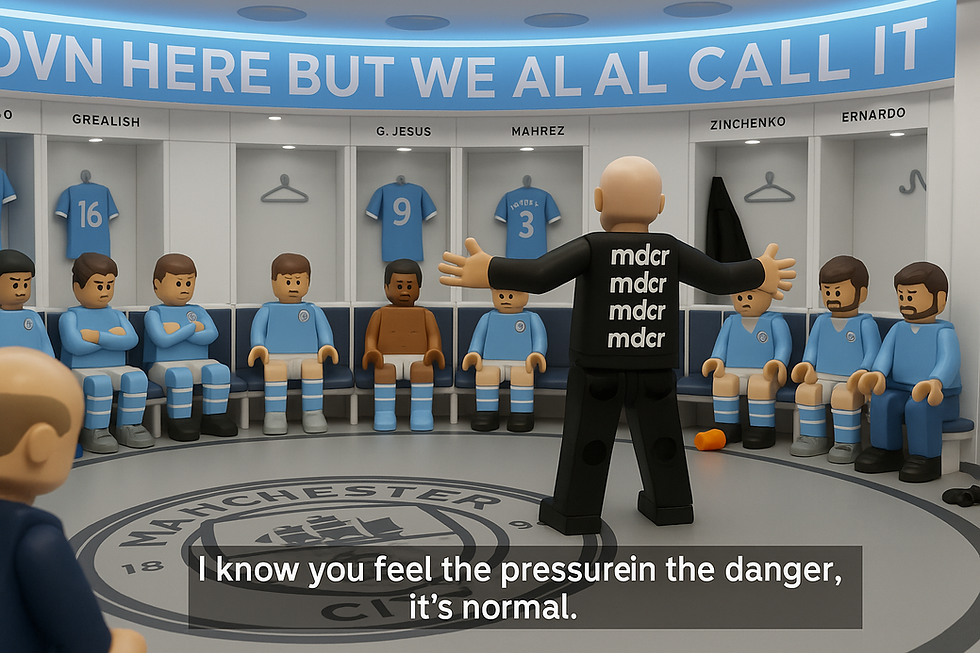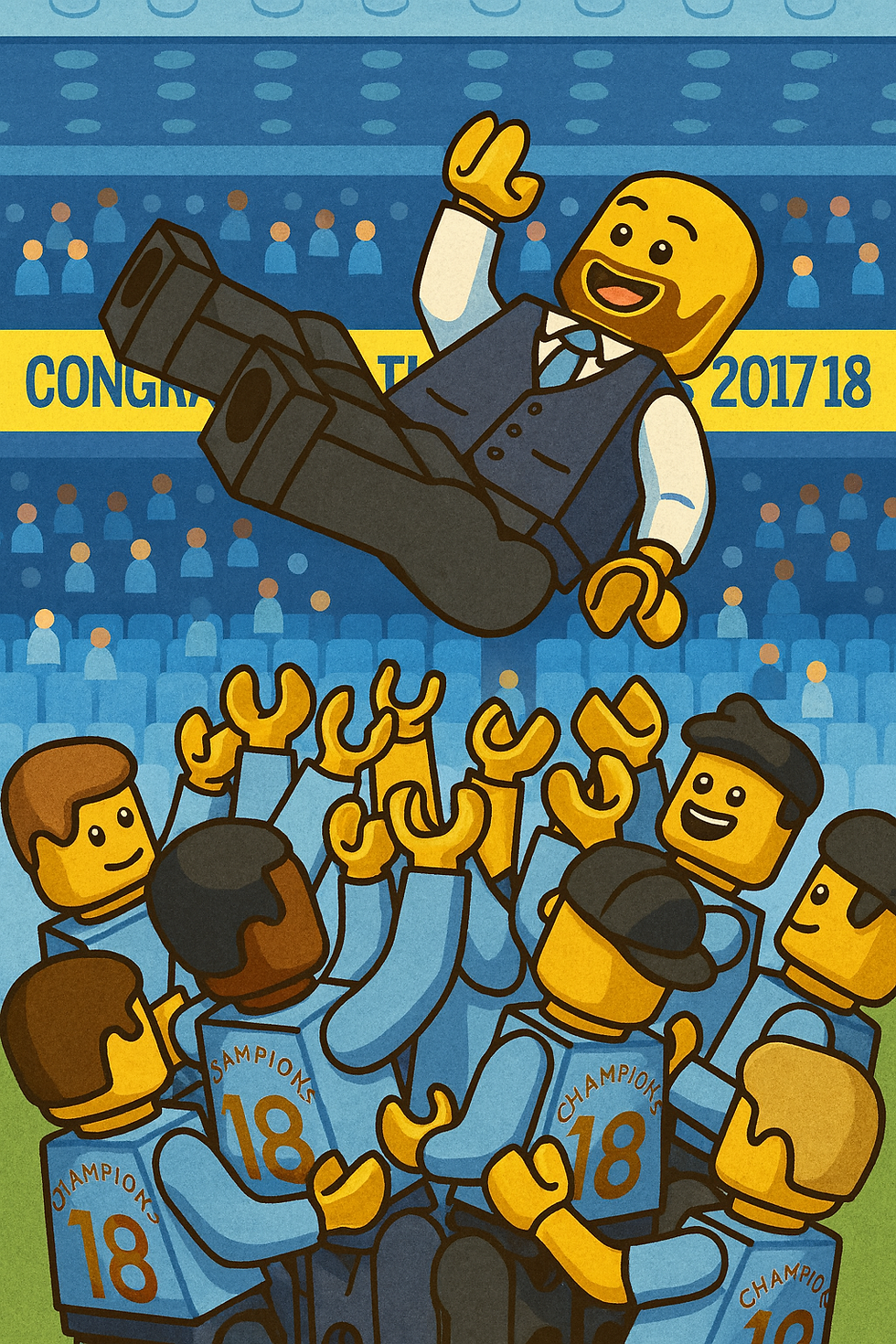The Pep Talk: Why Every Daily Stand-Up Needs a Bit of Guardiola
- Darren Emery
- Apr 7, 2025
- 4 min read
Updated: Aug 12, 2025
I’ve written my thoughts previously on why I hate daily stand-ups.

Not because they can’t be valuable, but because they almost never are.
As a former professional athlete, I’ve always been obsessed with what makes teams perform at their best - both on the pitch and in the boardroom. Even though my playing days are behind me, that drive for peak performance fuels the way I support corporate teams and help build products that excel under pressure.
I’m constantly drawn to the behind-the-scenes of elite performance, which is why I love sports documentaries like the 'All or Nothing' series on Netflix.
I keep coming back to the Manchester City episodes. There’s something magnetic about watching Pep Guardiola in those dressing room talks. It’s not just passion - it’s precision. You can feel the clarity, the intent, the trust he builds with his players in real-time. He’s not just reviewing what happened; he’s setting up what’s next.
And that got me thinking: what if the principles behind Pep’s football philosophy - adaptability, trust, clarity, and relentless improvement - are exactly what our daily stand-ups are supposed to be?
Whether you're coaching Manchester City or a cross-functional product squad, it turns out the approach isn’t all that different.
Maybe the problem isn’t the stand-ups themselves - maybe we’ve been playing the wrong formation. We’ve read the “Agile” guru textbooks, we followed the Scrum Guide and thought we had it all figured out, but what if we should’ve been learning from an elite performer like Pep, not a process preacher?
Pep doesn’t bring the squad together to hear “I worked on X yesterday.” He’s setting the tempo, adjusting the shape, making sure every player knows their role and why it matters. Your stand-up should do the same – they need to be high-performing sessions, not a daily chore.
Here are five ways to run your daily meeting like a Guardiola team talk — sharp, focused, and built to win.
Five Keys to a Guardiola-Style Stand-Up

Let’s be clear: this isn’t about renaming your Scrum Master to “Head Coach” and calling your stand-up a “team talk.” It’s about rethinking the purpose of the session. Less task-tracking, more tempo-setting. Less “what did you do yesterday,” more “how are we going to win today?”
Pep doesn’t waste time with empty updates. He energises, aligns, and prepares his team to play. So if you want your stand-up to actually drive performance, not just report on utilisation, here’s what you can steal from Guardiola’s playbook:
1.) Set the Tempo, Don’t Just Recap
Forget status updates. (I underlined it because this is my biggest bug bear). This is about setting the tone: intent and energy. Pep doesn’t walk into the dressing room and ask who did their homework. He gets straight to what matters today. What’s the challenge? Where’s the pressure? What’s the goal? Set the tone for action -make sure the team knows where to attack.
Try this:
“Here’s our key focus today. What do we need to do to make progress on it? Anything slowing us down?”
2.) Clarity Over Control
Every player on the pitch knows their role - not because Pep micromanages, but because he makes the mission crystal clear. Stand-ups shouldn’t be about surveillance. They should help the team see the bigger picture and how their individual work contributes; it’s a chance to connect the dots between roles, not just report on them.
Try this:
“Is everyone clear on where their piece fits into today’s plan? Any gaps or overlaps we should clear up now?”
3.) Collaboration > Cooperation
There’s a big difference between players working side by side and players working together. Pep’s teams thrive on deep collaboration — reading each other's movements, covering spaces, and pressing as a unit. Communication isn’t just encouraged; it’s woven into their play. Constant scanning, talking, adjusting — that’s what allows them to move as one. Agile teams should operate the same way.
A great stand-up doesn’t just inform - it sharpens focus. In football, players don’t just do their job; they anticipate what’s next, cover for each other, and adapt in real-time. Your team doesn’t need a laundry list of tasks - they need awareness. What’s happening across the board? Where can we jump in and support each other? What’s shifting that we need to respond to?
Try this:
“Who needs to link up today? Are there any handoffs or pairings that’ll help us move faster?”
4.) Fluid, Not Fixed
Tactics change mid-game. Pep doesn’t wait until halftime to adapt - his teams are trained to read the game and shift shape instantly. Your stand-ups should foster this same mindset of rapid-decision making. Too often they become places for naming problems without solving them. If a decision needs to be made - make it: and empower team members to act, even if they aren’t in a Stand-up. If priorities shift, shift with them. Plans evolve. What matters is how fast you move. Don’t just log blockers, clear them.
Try this:
“Have priorities shifted? Do we need to adjust anything based on new info or blockers?”
5.) Mindset Is Momentum
Guardiola doesn’t just build tactics - he builds belief. His talks are laced with energy, purpose, and a reminder that this team can do big things. That kind of energy is contagious. Your stand-up doesn’t have to be a TED Talk, but a quick injection of focus and belief can go a long way. It can be a pulse check on team morale. Celebrate momentum. Call out effort. Acknowledge when it’s tough, but remind people what you’re building together.
Try this:
“We’ve got a tough day ahead, but we’re in a good spot. Let’s stay sharp, move fast, and back each other.”
Full-Time

A stand-up isn’t a ritual. It’s a reset. A tactical team talk. A chance to connect, adapt, and go again - with purpose.
Not every session is going to be perfect, but that’s ok: we iterate and improve.
So forget the checklists. Run it like Pep. Set the tempo. Sharpen the team. And go out there with a plan to win.




Comments